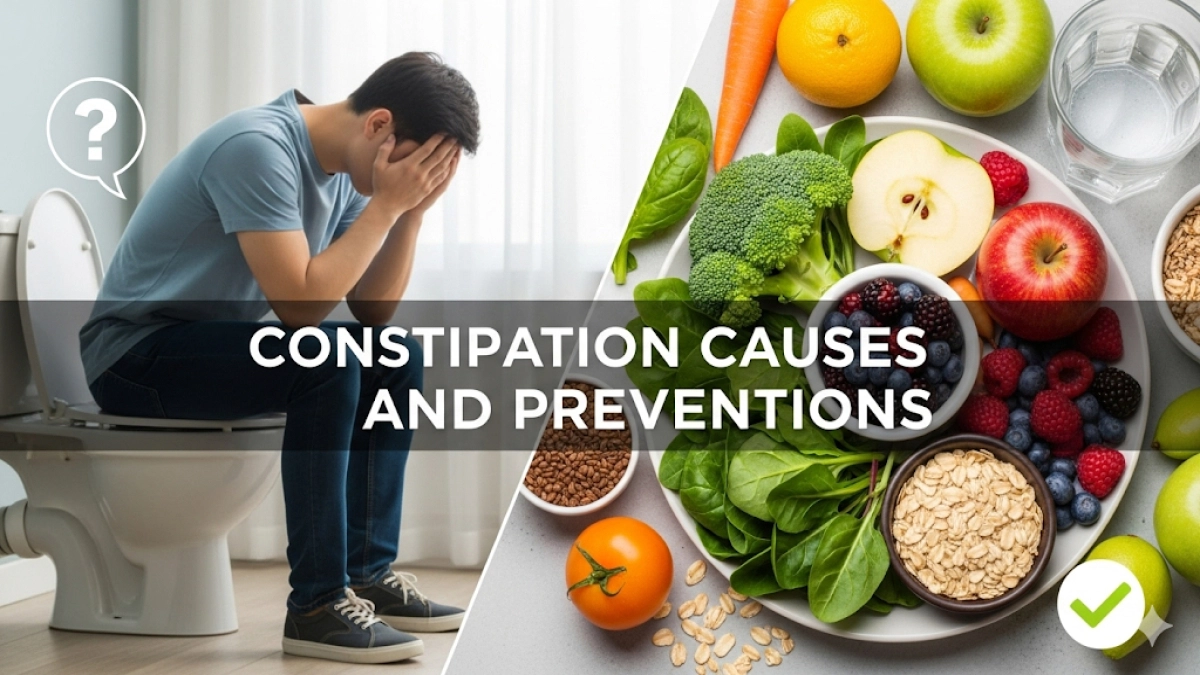Constipation is a common yet often misunderstood digestive issue that affects millions worldwide. While it might seem like a minor inconvenience, chronic constipation can significantly impair quality of life and signal underlying health concerns.
This comprehensive article delves deeply into the multifaceted causes of constipation and offers evidence-based, practical prevention strategies. Our goal is to provide a nuanced, expert-driven resource that not only informs but empowers readers to take control of their digestive health.
Understanding Constipation: More Than Just Infrequent Bowel Movements
At its core, constipation is characterized by infrequent, difficult, or incomplete bowel movements. However, the experience varies widely among individuals. Some may have fewer than three bowel movements per week, while others struggle with hard stools or a sensation of blockage. Recognizing this variability is crucial for tailoring effective interventions.
The Physiology Behind Constipation
The large intestine’s primary role is to absorb water and electrolytes from waste material, forming stool. When stool moves too slowly through the colon, excessive water absorption occurs, resulting in hard, dry stools that are difficult to pass. This slowed transit can stem from multiple physiological disruptions, including impaired muscle contractions or nerve signaling.
Primary Causes of Constipation: A Multifactorial Puzzle
Constipation rarely arises from a single cause. Instead, it is often the result of an interplay between lifestyle factors, medical conditions, medications, and psychological influences.
1. Dietary Factors
- Low Fiber Intake: Dietary fiber adds bulk and softness to stool, facilitating easier passage. Diets deficient in fiber-rich foods like fruits, vegetables, and whole grains are a leading contributor to constipation.
- Inadequate Hydration: Water is essential to keep stool soft. Insufficient fluid intake exacerbates stool hardness.
- Excessive Processed Foods: High consumption of processed, low-fiber foods can slow bowel transit.
2. Sedentary Lifestyle
Physical activity stimulates intestinal motility. Prolonged inactivity or sedentary habits reduce this stimulation, increasing constipation risk.
3. Medications and Supplements
Certain drugs are notorious for causing constipation, including:
- Opioid painkillers
- Antacids containing aluminum or calcium
- Iron supplements
- Some antidepressants and antipsychotics
4. Medical Conditions
Underlying health issues can disrupt normal bowel function:
- Irritable Bowel Syndrome (IBS): Particularly the constipation-predominant subtype.
- Hypothyroidism: Slows metabolism and gut motility.
- Diabetes: Can cause nerve damage affecting bowel movements.
- Neurological Disorders: Parkinson’s disease, multiple sclerosis, and spinal cord injuries impair nerve signals to the colon.
- Structural Abnormalities: Such as colorectal strictures or tumors.
5. Psychological Factors
Stress, anxiety, and depression can alter gut motility through the gut-brain axis, contributing to constipation.
6. Ignoring the Urge to Defecate
Habitually delaying bowel movements can desensitize rectal nerves, leading to chronic constipation.
Latent User Queries Addressed
- Why does dehydration cause constipation?
Water softens stool; without enough fluid, stool becomes hard and difficult to pass. - Can stress really cause constipation?
Yes, stress affects the nervous system controlling gut motility, often slowing it down. - Are there natural remedies for constipation?
Yes, including dietary fiber, hydration, physical activity, and certain herbal supplements.
Prevention Strategies: A Holistic Approach
Preventing constipation requires a multifaceted strategy that addresses lifestyle, diet, and underlying health.
1. Optimize Dietary Habits
- Increase Fiber Intake: Aim for 25-30 grams daily from diverse sources such as fruits, vegetables, legumes, nuts, and whole grains.
- Hydrate Adequately: Consume at least 8 glasses (about 2 liters) of water daily, adjusting for activity level and climate.
- Limit Processed Foods: Reduce intake of refined grains, fast food, and excessive dairy.
2. Regular Physical Activity
Engage in at least 150 minutes of moderate exercise weekly. Activities like walking, swimming, and yoga enhance bowel motility.
3. Establish Consistent Bathroom Routines
Respond promptly to the urge to defecate. Consider setting regular times, especially after meals, to encourage bowel habits.
4. Review Medications with Healthcare Providers
If constipation coincides with new medications, consult a doctor about alternatives or adjunct treatments.
5. Manage Stress Effectively
Incorporate mindfulness, meditation, or counseling to mitigate stress-related gut dysfunction.
6. Consider Probiotics and Prebiotics
Emerging research suggests that gut microbiota modulation through probiotics (e.g., Bifidobacterium, Lactobacillus) and prebiotics may improve bowel regularity.
Actionable Takeaways
- Track Your Bowel Movements: Use a diary or app to identify patterns and triggers.
- Gradually Increase Fiber: Sudden increases can cause bloating; introduce fiber slowly.
- Stay Hydrated: Pair fiber intake with adequate fluids to prevent stool hardening.
- Move Daily: Even light activity can stimulate digestion.
- Seek Medical Advice: Persistent constipation warrants evaluation to rule out serious conditions.
Expert Analysis: The Role of Gut Microbiome in Constipation
Recent studies highlight the gut microbiome’s influence on bowel habits. Dysbiosis—an imbalance in gut bacteria—can impair motility and stool consistency. Personalized microbiome profiling may soon guide targeted probiotic therapies, representing a frontier in constipation management.
Section for augmentation: Incorporate proprietary data from clinical trials or patient case studies demonstrating microbiome interventions’ efficacy.
Personal Anecdote: A Journey from Chronic Constipation to Relief
[Placeholder for a first-person narrative or patient story illustrating the emotional and physical toll of constipation and the transformative impact of lifestyle changes and medical guidance.]
Conclusion: Empowering Digestive Wellness Through Knowledge and Action
Constipation is a complex condition influenced by diverse factors ranging from diet and lifestyle to medical and psychological health. By understanding its multifactorial causes and implementing comprehensive prevention strategies, individuals can reclaim digestive comfort and overall well-being. This article serves as a definitive guide, blending expert knowledge with practical wisdom to illuminate the path toward lasting relief.

